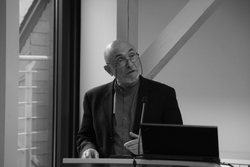Prof. Dr. Yoram Shachar
Radzyner School of Law, Interdisciplinary Centre Herzliya
Curriculum Vitae
Prof. Dr. Yoram Shachar studierte in Tel Aviv und Oxford Rechtswissenschaften und promovierte 1976 in Oxford mit einer Arbeit über „Containers in the Law of Carriage of Goods“. Nach Forschungsaufenthalten in Philadelphia und Freiburg wurde Prof. Shachar 1985 als Direktor an das Institute of Criminology and Criminal Law der Universität Tel Aviv berufen, das er bis 1988 leitete. Neben Professuren an der Rechtswissenschaftlichen Fakultät in Tel Aviv (bis 1992) sowie an der Hebrew University (1991-1996) war Prof. Shachar von 1996 bis 1998 Dekan der Radzyner School of Law (Herzliya, Israel). Darüber hinaus führten ihn Gastprofessuren und Fellowships unter anderem an die University of Southern California in Los Angeles (Ben-Gurion Visiting Professor of Law), nach Heidelberg (Max Planck Institute for Public and International Law) sowie an die University of California, Berkeley (2000 und 2004).
Prof. Dr. Yoram Shachar war von April bis September 2011 Fellow am Käte Hamburger Kolleg „Recht als Kultur“.
Forschungsprojekt
Law’s Presence: A Comparative Study of Court Scenes in Civil and Common Law Cultures
The different cultural images of law reflect both the realities of legal forms and the role of law in different societies. While lively court scenes figure prominently in both high and popular culture (Literature, Theatre, Cinema and Television) in Anglo-American societies, they seem to be almost absent from European culture. In an earlier study I have described the differences and explained them on the basis of the structural differences in legal process, but further surmised that the structures themselves reflect some deeper differences in the perceived role of law. Concentrating on America, Germany and Israel, I have claimed that court scenes are only embedded in cultural representations where law itself retains a childish battle-like form intended to explore and decide broad moral issues by popular discourse. Where law has been entrusted to professional bureaucracies it has left little impact on general culture.
My goal in the present study would be to update these findings. It is my impression that all three cultures have undergone some rapid changes in the last decade. Court scenes that have almost dominated American culture for more than a hundred years have reached an apex in the 1990’s and have now almost disappeared from cinema, theater and television. Heroic legal scenes have abruptly given way to other scenes and to a first onslaught of realistic non-heroism. Israel (and perhaps Germany) seems to have gone in the opposite direction. Courts and lawyers have made inroads into the writings of leading novelists and into popular culture (mainly popular literature and television). If I am correct in my former assumptions, these changes may reflect some interesting shifts in communal values.
I further intend to explore the links between law and culture in Jewish tradition. I hypothesize that, as in modern Europe, Jewish law has always been academic and professional. Popular court scenes have therefore been absent from both folklore and literary sources. Occasional court scenes (e.g. Solomon’s Judgment) entered Jewish story-telling, but they depicted the pragmatic problem-solving powers of secular rulers rather than substantive moral discourse.
Publikationen (Auswahl)
Herausgeberschaften
- (1978-1979) Tel Aviv University Studies in Law, Volume 4 Editor
- Y. Shachar, A. Marmor, (1985) Sources in Criminal Law (3 Vols., Hebrew)
- A. Kirschenbaum, Y. Shachar, E. Ohlbaum, (1986, 1988) Sources in Comparative Criminal Law (English)
- Ha’Sanegor (Journal of Israel Public Defender Office), Advisory Board, 1998
Aufsätze
- Jeffersom Goes East: The American Origins of the American Declaration of Independence, Theoretical Inquiries in Law 589 (2009)
- When Faust Takes A lawyer: On the Relations Between Law and Culture, Din U’Devarim 147 (2007)
- Criminal Law and Culture in Israel, Plilim (Israel Journal of Criminal Law) 77 (1998)
Forschungsschwerpunkte
- Strafrecht
- Recht und Kultur
- Rechtsgeschichte


